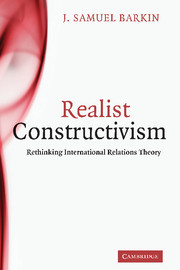10 - Constructivism and realism
Published online by Cambridge University Press: 05 June 2012
Summary
Both constructivism and realism often suffer from a castle syndrome, in which they are seen as paradigms, as exclusive and self-contained research orientations for the study of international relations. This syndrome is characterized by definitional overstretch, in which both terms are defined broadly enough, and in a wide enough variety of ways, that they threaten to become meaningless as descriptions of specific approaches to the study of international relations. Furthermore, this overstretch can lead to sets of practices within the rubric of each approach that are internally mutually contradictory. Ironically, this overstretch also leads to arguments that constructivism and realism are incompatible.
This book set out to address these problems. It set out to rehabilitate both constructivism and realism as viable terms of description of specific, internally consistent approaches to the study of international relations, and to discuss their relationship with each other. The various strands of argument presented here may at times seem diffuse, but they coalesce into two primary, and related, sets of arguments. The first of these is that we should define approaches to the study of international relations by their core concepts, and look at the complex ways in which these concepts interact. The second is that having done so with two such approaches, constructivism and realism, we may find that they have more to say to each other than is often assumed.
- Type
- Chapter
- Information
- Realist ConstructivismRethinking International Relations Theory, pp. 154 - 173Publisher: Cambridge University PressPrint publication year: 2010



